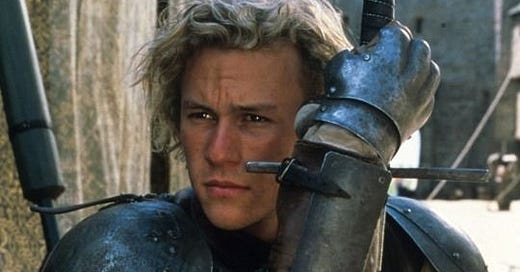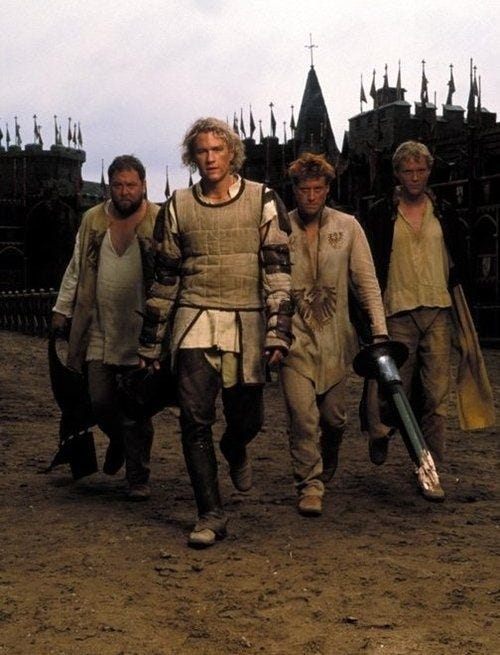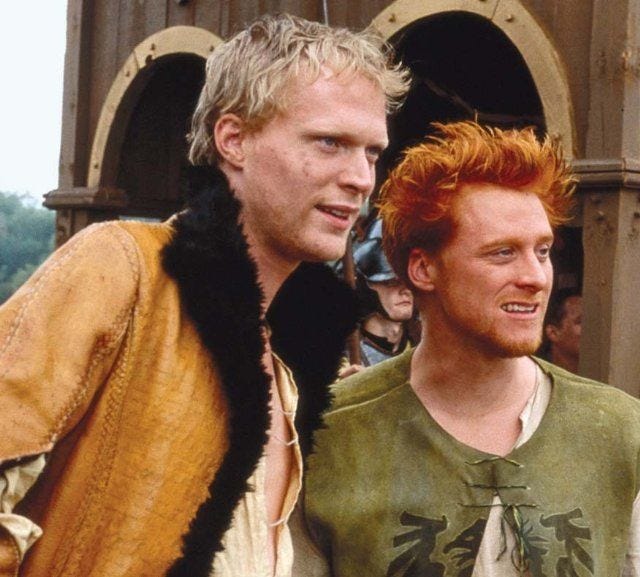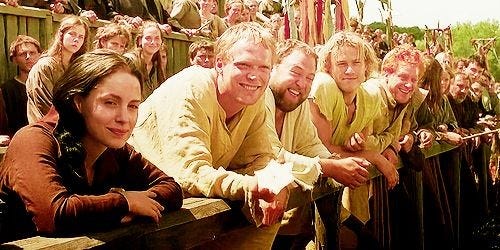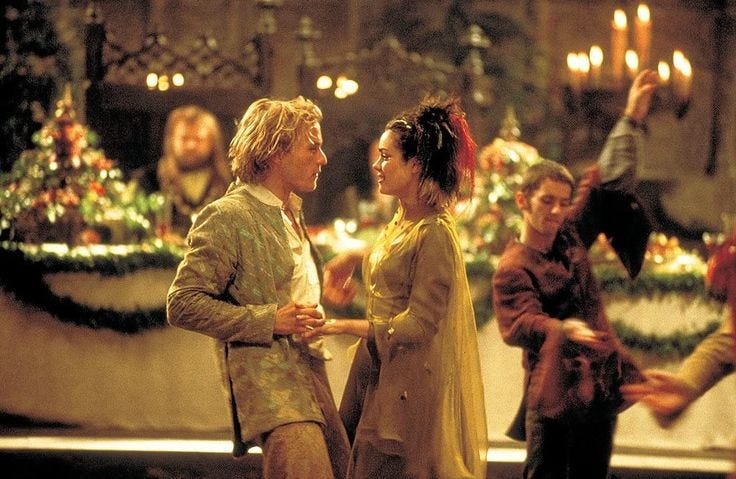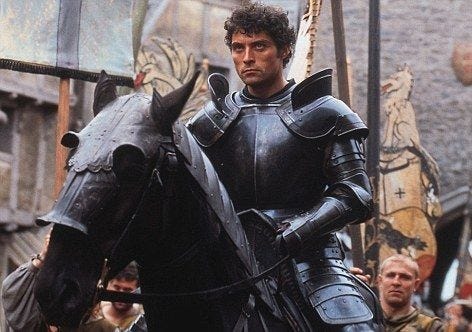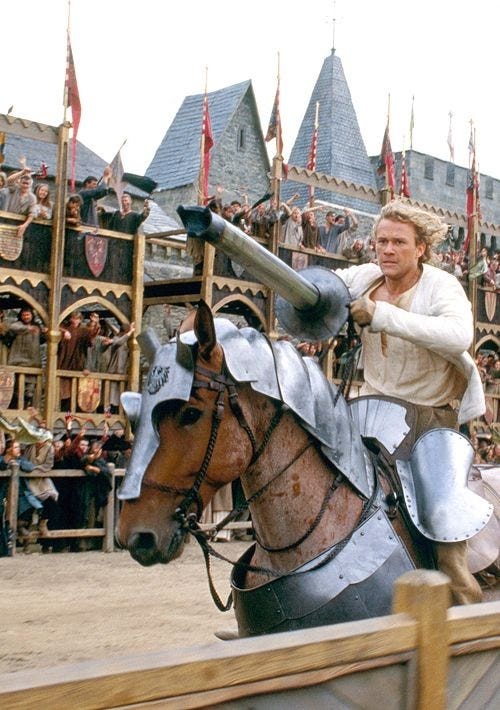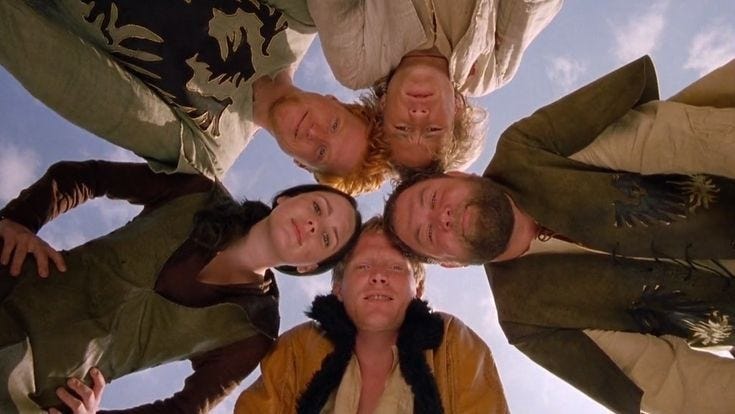A Knight’s Tale: Will Power
The 2001 action comedy is a spiritual allegory about aligning with your heart & will to change your life
I wrote this a while back, when I thought I might be doing some pop culture writing for an online mag. At least 65% of my conversations in a given week are about storytelling, so it’s a bit funny that it’s actually taken me so long to write about it. I’ve left this piece largely unedited from when I first wrote it, although there are some things I would add if you sat me down and got me yapping. Maybe at some point.
I love this movie, unabashedly. As a work of cinematic storytelling, it is basically perfect. It may not be to one’s taste, but the story, characters, structure, pacing, payoff, art design, are god tier filmmaking. That is not really what this essay is about, I just wanted to unequivocally declare my fan girl status bias.
The greatest storytelling is storytelling that works on the practical, personal, universal, and spiritual levels, and A Knight’s Tale works as both an utterly delightful cinematic experience, as well as profound spiritual allegory.
This is about a movie that shows us what it is to commit to your heart, and to be a hero. Let’s go!
-Cara
A Knight’s Tale: Will Power
A Knight’s Tale, the 2001 anachronistic medieval romantic comedy adventure written and directed by Brian Helgeland and starring Heath Ledger, Shannyn Sossamon, Paul Bettany, and Rufus Sewell, is not about what you think it’s about. It seems like it’s about some young guy hungry for glory, who has to beat a badguy and win the girl. You could not be more wrong, you absolute lunatic! It’s obviously a deeply spiritual story about the manifestation of one’s will through heroic action fueled and nurtured by love.
A Knight’s Tale is about how the force of your will can bend probability in your favor so much that it completely demolishes the very substantial mental and physical barriers of some big things most of us have a hard time talking about: money, class, social pressure, and their combined power.
It’s an allegory for transcending the limitations of the fears of your culture by tapping into the version of yourself that is dying to come forth and meet challenges and expand - the Higher Self. This story illuminates how inhibitions of the psyche are codified into societal structures via class and culture to keep people in their place, and how it takes a strong personal vision, galvanized and empowered by love, to challenge & bend the barriers.
This film is about tapping into the part of yourself that is able to look your worst fears in the eye and say “I love what I love more than I am afraid of you. So bring it on.” It doesn’t hurt that it’s funny, clever, earnest, well-paced, aesthetic as hell, and wildly entertaining.
THE WILL TO ACT
“Badger me not with details!”
-William
William (the legendary Heath Ledger) is a dirt poor medieval peasant, whose Lord has been killed by a jousting blow at the opening of the movie, minutes before he is due to show up for his final, and potentially winning round of jousting at a local tournament. Will and the boys have not eaten in three days (hard times abound, even for their late Lord, it would seem). Panic commences. Well, Wat (Alan Tudyk) panics, and begins one of the recurring jokes of the movie; temper and tendency toward comically violent outbursts. William acts. Immediately.
Will takes his bested boss’s armor and puts himself in the tournament. He has wanted to be a knight since he was a child, we learn later via flashback. And then, when the very dangerous opportunity arises, he leaps immediately. That kind of decisive action is born out of someone who already knew what they wanted, and has decided in their heart of hearts, that they are willing to go all the way. He doesn’t have a plan beyond that exact moment. He inherently trusts his desire and his instincts. In the age of paralysis analysis, this is a welcome example.
William’s ability to completely psychologically commit to his actions is such a powerful force from the start of the movie, that his friends have almost no choice but to go along with it and help him. Their very legitimate concerns about being found out by the nobles, and, you know, executed, wilt under the enthusiasm of William’s dream.
You could see this as reckless and dangerous. It is. And it works. William gives his friends a chance to stand up to him, and while they give him a hard time, they fold pretty quickly, because deep down, they too, want more than simply a full belly and a safe place to sleep. They want to live.
CLASS & AND ITS GATEKEEPER: THE WORD
“I’m a Knight and I will put myself to the hazard!”
“A knight in your heart, but not on paper, and paper’s all that matters to them.”
-William & Roland
William, Roland (Mark Addy), and Wat, start practicing. They start winning. They decide to go after bigger fish; there’s just one small, tiny detail they haven’t solved yet, and don’t seem to have any plan to deal with: William’s lack of pedigree on paper. Only nobles may compete. While in modern American society we don't experience class exactly the same way as needing patents of nobility, how would you describe Ivy League degrees?
Words are powerful, and how they are wielded can be both magical and uplifting, and destructive and limiting - such patents are an expression of the power of the Word. We are so thoroughly entrenched in the power of the written word that we don’t notice i’s weight, but in the middle ages it was pretty close to magic, and it was a magic passed down and kept within a tight hierarchical class system. Peasants don’t read and write - not only are they too dumb, they do not have the inherent right to engage with such a practice. God chooses who is a noble through fate and mysterious schematics of family bloodlines, and who are you to question God?
In this world, standing up beyond your caste was, indeed, punishable by humiliation and death; it was seen as an affront to nature. Convenient for the ruling class, eh? The nobles had a lot to lose, and even one peasant realizing that they are just as entitled to elevated experiences (jousting and the honor and riches of being a knight, in this case), is one peasant too many.
Good thing William finds himself a word-magician in the form of the one, the only, Geoffrey Chaucer.
CHANGE YOUR STORY, CHANGE YOUR STARS
“A man can change his stars.” - William
Geoff (Paul Bettany), is discovered, naked, in the wild -- he is a force of nature, bizarre and chaotic, but vulnerable and open. Based on the actual medieval author responsible for the Canterbury Tales, Geoff is as big of a personality as possible, and for a man who has seemingly lost it all, he carries himself with immense pride and panache. He’s also sly as a fox, and immediately sniffs out the gang’s severe lack of proper paperwork, and finds his place as Will’s herald. The boys don’t even know what a writer really does, but Geoff explains it all, and becomes the key to entering the sanctum sanctorum of the arena of nobility and possibility.
Geoff’s role in the group expresses something hidden in plain sight about society and culture: people are who you think they are, based on what stories you have been told about them. The way we experience any and all events that we are not personally present for, is done through narrative and story, and having a funny, and charismatic guy following you around, yelling and declaring who and what you are to everyone around you, directly informs how those people think and feel about you, for better or worse. Your friends, your Tweets, all of it tells a story about who you are, and that story will inform where you go.
Geofff’s epic heraldic monologues, sincere as they are bombastic, are also expressive of the fact that the power of Will’s dream - to be a knight, and to live with honor and courage - is so galvanizing that it also changes Geoff’s life, and pulls him out of a horrible situation (the situation that left him naked, wandering in the wild at his intro). We are seeing how one person’s love for their friends, combined with their personal goals, can begin to create a sort of energetic momentum that changes all of them.
PROVE YOUR LOVE
“She is the arrow.” - William
When the gang arrives in town for the first big tournament, where there is significantly more prize money and a chance for Will to start really making a reputation, he happens upon Jocelyn, and it’s love at first sight. Their love story is something that as a teenager, I had very confused feelings about. I simply didn’t understand it. A little older and wiser, I understand it a lot better now (because it’s happened to me): to meet someone and be changed in the meeting. To feel that by their very presence, you feel bigger, lighter, more powerful, and more yourself. That’s something love can do.
When Will meets Jocelyn, this is what he begins to undergo. Jocelyn is a princess. Of where? Doesn’t matter! This is all allegorical, all that matters is that she represents something that is supposed to be untouchable to Will, and because she is untouchable, he must transcend his own limitations in order to even stand a chance at impressing her. Every character is deeply symbolic in this film, but let’s focus on the major players: Will, Geoff, Jocelyn, and Adhemar. They are the main players because their roles represent larger forces at work within the story (although every character gets to play an important part, for example, Kate the blacksmith’s determination and creativity expressed through her breakthrough technology armor that helps Will level up).
So back to Jocelyn. She’s not just an allegory, she’s a person in a very difficult situation, who is also a prisoner of class. Noble women were expected to be absolutely fine being used a capital in their parents’ power games, and when we learn that the Bad Guy (more on him in a moment) has started talking to Jocelyn’s dad about marriage, something becomes clear -- she wields what power she can: the power of her attention, mind, and heart, but she is also up against the cold iron bars of a social prison. It seems like Adhemar can just sort of buy her, via being a noble with military and social capital. Ew.
Jocelyn is not into this, but I’m getting ahead of myself. When William has earned her initial attention and then tries to impress her further, we learn that she’s pretty fucking tired of pompous dudes declaring that something they are doing for their own reputation - competing and getting prize money and fame - is also somehow for her. It costs them nothing to try and impress her by chasing their own gain, and also demonstrates a complete ignorance of what might make her tick - does she even like jousting? Did you ask? No, you only think about yourself.
So when Jocelyn tells William that in order to impress her, he must lose on purpose, we learn that in order to be a contender for a powerful love and connection, it must be earned by a surrender to humility, and the open-hearted vulnerability - the courage - that that surrender demands.
While this is an extreme example, it shows Jocelyn that Will’s intentions are pure. Ego, fame, and power, are all social capital, and in a world dominated and controlled by social capital, Jocelyn yearns for the opposite: pure connection, divorced from power-games. This act of surrender on Will’s part opens him up to experiencing a strength beyond what he had yet tapped into: the strength that comes from a pure love that wants nothing from you but to connect and see you as your best self.
It is this strength that gives William the heart to fight his hardest battle, and completely commit to his pursuing his vision.
THE SHADOW
“You have been weighed, you have been measured, and you have been found wanting.” - Adhemar
Adhemar (Rufus Sewell), is the bad boy: he’s sexy, he’s witty, he’s the talk of the city. He’s motivated by the usual suspects: money, power, fame, and conquest. He wants Joceyln, not because he gives a single shit about her, but because she represents, again, the Untouchable. Whereas Will would earn Jocelyn’s love through humility, vulnerability and surrender, Adhemar would do the opposite: coercion, violence, control, and domination. He is as motivated by a vicious, but brilliant, Ego, completely ungrounded in love or any higher motivation. He is a byproduct of his culture in the worst way.
Will has to tangle with this guy, and his frustration in trying to play Adhemar’s games on Adhemar’s terms, almost costs him everything. He gets distracted by the jeers and threats of a lesser man because he feels defensive and insecure, and that hurts his connection to those he loves. That includes his squad, who are frustrated at William’s inability to enjoy victories where Adhemar wasn’t present. They’re busting their asses and putting their lives on the line, too. William has to relax and stand firm in the confidence of his mission, and not let himself get emotionally worked over by a real asshole.
Will has to connect and ground himself in something deeper than his ego, the core of who he is. The love of Jocelyn and his friends is very powerful, but there is a part of the individual that must find a way to still and earn its own respect outside of external support. Will must reconnect to his inner child, who represents his pure, highest self. When they journey to London for the final tournament, fate delivers what he needs.
I AM A KNIGHT
“You aim too high, “
“If there’s another way to aim, I don’t know it,”
-Roland & William
Will’s return home and discovery of his actually-still-alive father (Christopher Cazenove in a brief but heart-stirring performance), gives him the exact emotional experience that he needed: to reconnect to the pure hearted striving of a child. A child’s desire to self-elevate has little to do with money or fame, in fact, not once in the entire film does Will seem to pay any notice to the utterly paradigm-shifting experiences he is having of wealth, nice clothes, and moving in the upper class. He is too filled with the pure joy of doing what he has always felt called to do: be a knight and sharing that elation with those he loves.
We see that as a young boy, knights represented something powerful to him; something ineffable and inherently motivating that compelled him to be honorable and brave. When Will settles into this deep, pure love of knighthood through reconnecting with his father and the neighborhood he grew up in, his need to strain against Adhemar relaxes. He still wants to win, but he is now utterly confident, utterly present. His ego has relaxed into the greater whole of his being. He knows who he is, and trusts his friends, his love, and himself.
Just one problem! Adhemar, the walking embodiment of forces of control and domination, exists to thwart Will’s attempt to win through self-actualization.
WHAT IS A KNIGHT?
“I will not run!” - William
As Will transcends the self-limitations of ego battles, he is thrust into an even larger, scarier situation: will you die for what you believe? Is your striving pure and done for its own sake?
This is not an accident, and it is not a misstep on anyone’s part, it is a natural and perhaps, the only possible, consequence of a reality-rupturing choice like William’s to be a knight: if you would ask for the biggest, most ambitious, calling of your heart, you better really mean it, because the forces of society, and maybe even Fate herself will put you through series of tests, to see if you are truly more in love with your calling than your ego is afraid.
Halfway through the film, he is tested somewhat subtly. Mid-tournament, he is informed that the knight he is about to joust is actually the Crown Prince of England, Edward, in disguise (James Purefoy, always a delight, even when only briefly spotted). It’s punishable by death to knowingly harm a Royal. Will jousts anyway, playing dumb. Edward, recognizing Will’s risk, deeply appreciates it, because he too is a class prisoner, and wants simply to play the bravery honor games of the tournament, but is prohibited because of his station. Gee, that surely won’t come up again!
When Will is ratted out by Adhemar, he is literally facing the worst case scenario. Everyone - and I mean everyone - tells him to run before he gets arrested. They are more concerned with him living to see another day than fulfilling his dream. That’s the crazy thing about dreams, they might ask you to seemingly jeopardize everything, including your life, on their altar, in the faith that they will deliver you to something greater. His friends want to save his life. His life means nothing without his dream.
Will refuses to run. He chooses to live and die as a knight, if that is his fate. He chooses his soul and his honor over his life. He recognizes that in order to be worthy of his calling, he must completely accept and surrender to the consequences of that commitment. Adhemar gloats, Will gets put in the stocks, it is not looking good. But something happens. Prince Edward.
Edward is the manifestation of the forces of Fate working on behalf of the Hero. He remembers and is deeply grateful to Will for giving him the opportunity to do what he loves, and steps in to literally lie under oath, and use his power as Prince to save a good man. He lies to reveal a greater truth: honor and love are more important than class and money, and even more important than the foundations of their society.
Will commits completely to his heart’s vision, and reality, including the rigid social structures that dominate the hearts and fears of every person around him, bends, and gives him what he wants.
Adhemar doesn’t stand a chance now, and even though he schemes and cheats, Will’s drive and love have made him invincible. He discards his literal and metaphoric armor of hiding his identity, of not being who he truly is, and it empowers him to utterly demolish Adhemar. Adhemar psychologically cannot exist in the reality that is unfolding around him, and that reveals his ultimate weakness: he was wholly dependent on controlling external forces to prop him up. Will cultivated a force within, that grew powerful beyond anything Adhemar could bring.
YOUR TEAM IS EVERYTHING
“Your men love you. If I knew nothing else about you, that would be enough.” - Prince Edward
A Knight’s Tale is a metaphor about the level of commitment a person can bring to discovering and listening to both their heart’s calling, as well as their ability to grow in relationship to the people that love and support them. Will would never have made it without his friends or Jocelyn.
This movie also established a style and mood that team adventure films (like some big budget superhero cinescapes we all kn0w) have continued to capitalize on. From the up-tempo classic rock soundtrack to the banter and camaraderie of the gang, there’s a lot to love about this film on the metrics of pure entertainment, and the riveting ensemble cast is the core of that. Every character is compelling and fun to watch, from Kate(Laura Fraser), to loyal, steady Roland (who trusts Will and himself to make very hard decisions and rally and focus the group on Will’s behalf), to Adehmar’s awkward herald (Scott Handy), desperately trying to be as effortlessly cool as Geoff is. Every twenty minutes feels like a mini story-arc, and the supporting cast make each peak and valley even more entertaining than the last. We get on board with William’s outrageous ambition, because his friends do, and they fight tooth and claw and bawdy tavern ballad for him.
This foundation of friendship, mutual admiration and respect carries the film and makes it more than a story about one man trying to prove himself. It’s a story about what a group of people who love and support each other can accomplish when they decide their individual goals are augmented and made more powerful by trusting and leaning on each other; and in doing so, they enable themselves to grow more courageous, and aim higher.
This is the core of a hero story. We are all the hero, and we are all the group, and when we learn to trust each other and to trust our hearts, we can change our stars.
“Welcome to the new world.” - William


